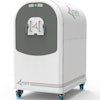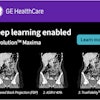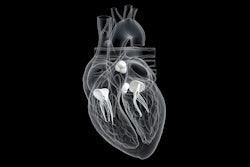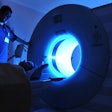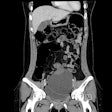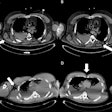New analysis from the influential Scottish COmputed Tomography of the HEART (SCOT-HEART) trial has been revealed in a paper published on 24 January, further bolstering the study's 10-year results. The researchers are now forging ahead with a new trial, SCOT-HEART 2, which may pave the way to coronary artery disease screening.
The study, posted by the Lancet, showed that more patients in the coronary CT angiography (CCTA) arm benefited from preventative therapies than those receiving standard care alone, indicating better patient management, and CCTA-guided management has a beneficial long-term impact on patient care.
"It's fantastic to see the impact the trial has had over the past 10 years, and to know that a vast range of people will read this paper across the entire medical spectrum," first author Prof. Michelle Williams, lead investigator and professor of cardiovascular imaging at the University of Edinburgh, U.K., told AuntMinnieEurope.com ahead of the publication date.
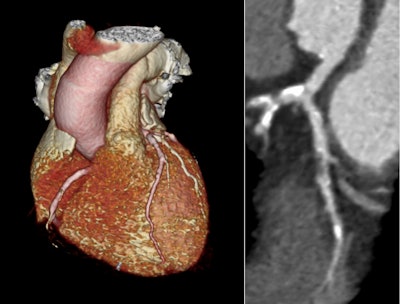 Example images from a coronary CT angiogram with 3D reconstruction and curved planar reconstruction of the left anterior descending coronary artery showing severe coronary artery disease. Courtesy of Prof. Michelle Williams and SCOT-HEART.
Example images from a coronary CT angiogram with 3D reconstruction and curved planar reconstruction of the left anterior descending coronary artery showing severe coronary artery disease. Courtesy of Prof. Michelle Williams and SCOT-HEART.
The SCOT-HEART trial explored the long-term benefits of using CCTA to guide care for patients with stable chest pain. Patients were divided into two groups: one received standard care with CCTA, and the other received standard care alone. After 10 years, those who had CCTA showed a significant reduction in the combined rates of coronary heart disease death and nonfatal heart attacks compared with those who did not have CCTA (6.6% vs. 8.2%). In particular, the CCTA group had fewer non-fatal heart attacks, highlighting the role of CCTA in improving patient outcomes.
These results were presented at the 2024 European Society of Cardiology congress (see news report). Since then, further data analysis has highlighted that patients randomized to CCTA had more prescriptions for preventative therapy such as aspirin, platelet, and statin therapies (odds ratio, 1.17; 95% confidence interval, 1.01 to 1.36) in year 10 of the study than those in the standard care arm, demonstrating that CCTA also had a positive impact on management.
The reduction in clinical events was similar across multiple trial subgroups based on sex, age, cardiovascular risk score, chest pain symptoms, previous coronary heart disease, and diabetes mellitus.
Change in practice
The findings may change clinical practice in parts of the world still reluctant to manage coronary artery disease with CT, Williams told AuntMinnieEurope.com. In the U.K., CT has been used for patients with suspected heart disease since 2016, but progress has been slower in other countries, including some European nations and the U.S., she added.
"The study provides even more evidence to help people wanting to set up new CT services for patients who would otherwise be missing out -- and to help support the increased use of CT around the world," said Williams.
Reportedly, no other randomized studies of CT have followed up patients for this length of time. The 10-year timeline was a prespecified endpoint in SCOT-HEART, as it was important for understanding the long-term impact of CCTA guidance, she explained, pointing to how Scotland's national record linkage, data service, and free prescribing made patient follow-up possible.
Prof. Michelle Williams reflects on a decade of research and looks ahead to the next 10 years. Video produced by Christof.G.Pelz | GRAFIFANT Creation | www.grafifant.at | 2025A second trial, SCOT-HEART 2, will assess CCTA in a randomized study of asymptomatic patients. This will be the first large-scale randomized assessment of CCTA in asymptomatic patients, noted Williams, who is also associate director of the British Heart Foundation Data Science Centre and a consultant radiologist.
"SCOT-HEART 2 will be very important, as it will answer the question: Should we use CT to screen people for coronary artery disease? We screen people for lung cancer, but heart disease kills many more people than lung cancer, so if there is an effective way of screening for heart disease that improves outcomes, then that will be of great benefit," she said.
Williams is confident that the trial will show changes in diagnosis because CT is excellent at identifying coronary artery disease, but it's not guaranteed to improve patients' long-term outcomes. "Will trial participation help patients stop smoking, or take more exercise? We're looking at the impact of CCTA on lifestyle, as well as on medical therapy and other management, and the long-term outcomes in these patients as well," she said.
Since 2020, the team has recruited over 5,000 patients with recruitment continuing for the rest of 2025. Half the cohort, 2,500 patients to date, has received a CT scan while the other half are receiving standard care, which involves assessment of their cardiovascular risk score. Patients will be followed up for both short-term and long-term clinical outcomes.
You can read the full open-access paper here: thelancet.com/journals/lancet/article/PIIS0140-6736(24)02679-5/fulltext

